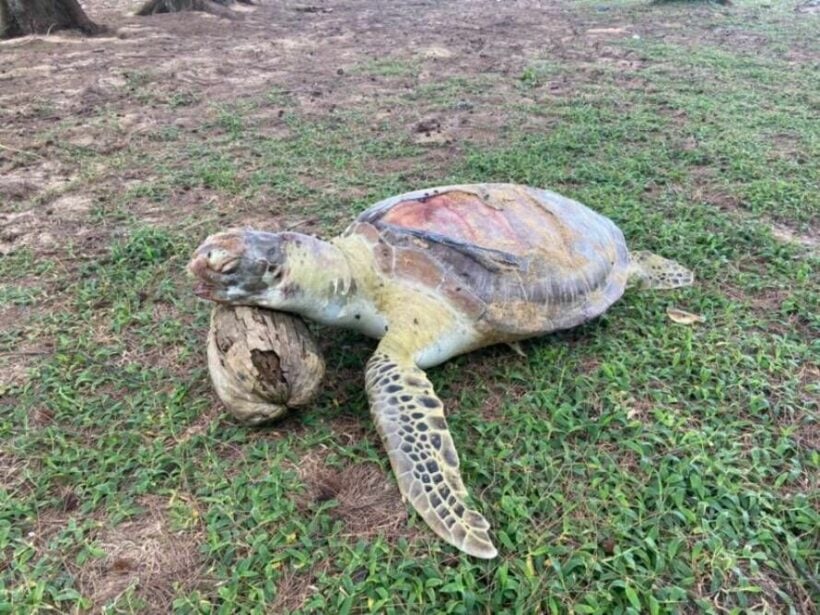Dead sea turtle with plastic lodged in its throat washes up on Phuket beach

A dead sea turtle with plastic lodged in its mouth and throat washed up on Mai Khao Beach in Phuket yesterday, July 11.
Winai Seh-ew, the village chief of Mai Khao subdistrict in Thalang district, received a call from lifeguards at Mai Khao beach to say a big Hawksbill turtle carcass had washed up on the shore. Upon inspection, the sea turtle was found to have plastic lodged in its mouth and throat, which was most likely the turtle’s cause of death.
The lifeguards said the turtle had a foul smell, so they expected that it died many hours before washing up on the beach.
Head of Sirinat National Park Sorosak Rananan and other park officials went to inspect the turtle and collect data before burying it in the sand.
Later that afternoon, a baby Hawksbill turtle washed up on the same beach. The baby turtle was still alive, but the national park officials have taken it to the national park’s sea turtle nursery for a health check up in case the turtle needs treatment.
Hawksbill turtles are listed as a Critically Endangered Species by the International Union for Conservation of Nature (IUCN). Plastic waste, ghost fishing (accidental fishing), coastal development, and climate change continue to threaten the species’ existence. Each year thousands of turtles are injured or killed by fishing equipment.
Turtles continue to be hunted for their eggs, with some cultures believing that the eggs have aphrodisiac qualities. Turtles are also harvested for their meat or used as shark bait by some fishermen. The World Health Organisation (WHO) cautions against the consumption of hawksbill turtle meat because the species feeds predominantly on toxin-containing sponges, which, if consumed by humans can cause neurotoxicity, kidney disease, liver cancer, and developmental defects in unborn children, according to WHO.
Hawksbills, alongside Kemp’s Ridley’s, are believed to be the most endangered of the seven species of sea turtle, with approximately only 8,000 nesting females left in the world.
Last month, national park officials in Phang Nga province found a 60-egg sea turtle nest on the beach. It’s always good news when sea turtle nests are discovered, and national park officials always do their best to ensure the nests are protected from predators. However, in reality, only 1 in 1000 eggs will make it to adulthood.
SOURCE: Daily News
Latest Thailand News
Follow The Thaiger on Google News:


























